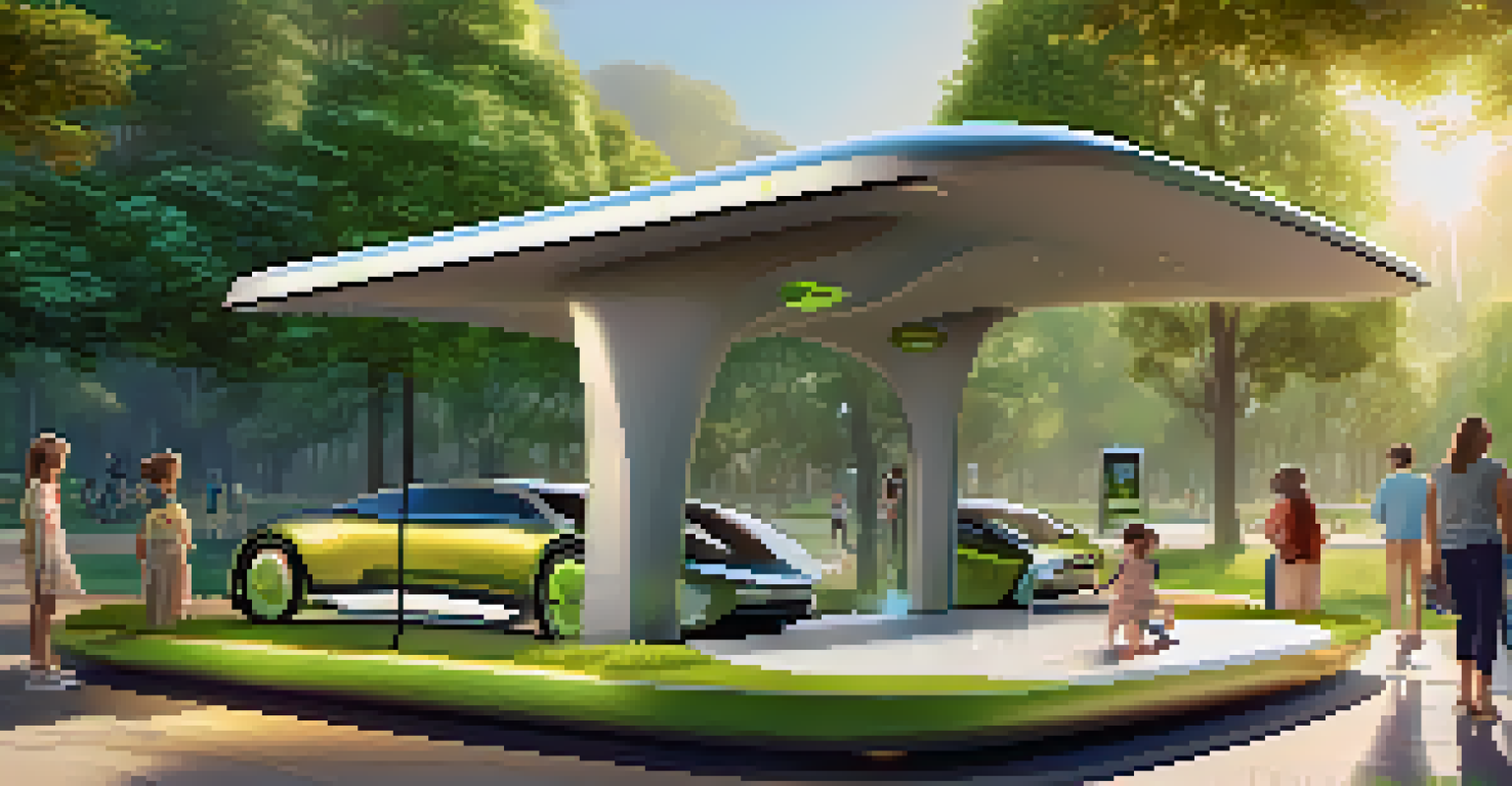How Illinois Addresses Climate Change: Policies and Initiatives

Illinois' Commitment to Climate Action and Sustainability
Illinois has taken significant steps to address climate change, exemplified by its ambitious goals laid out in the Climate and Equitable Jobs Act (CEJA). This landmark legislation aims for a 100% clean energy economy by 2050, showcasing a strong commitment to sustainability. By focusing on renewable energy sources like wind and solar, Illinois is not only reducing greenhouse gas emissions but also creating green jobs that benefit communities.
The future will be green, or not at all.
The CEJA also emphasizes equity, ensuring that marginalized communities are included in the transition to a clean energy economy. This holistic approach recognizes that the effects of climate change disproportionately impact these communities, making it essential to involve them in the solutions. Through job training programs and investments in clean technology, Illinois is fostering an inclusive environment for all residents.
Additionally, the state has pledged to reduce its carbon footprint by 50% by 2030, demonstrating urgency in its climate initiatives. This ambitious target reflects a proactive stance, pushing for innovative solutions that address both environmental impact and economic growth.
Renewable Energy Initiatives Driving Change
One of the cornerstones of Illinois' climate strategy is the expansion of renewable energy initiatives. The state has become a leader in wind and solar energy production, investing heavily in infrastructure to support these technologies. For instance, Illinois ranks among the top states for wind energy capacity, harnessing its natural resources to generate clean power.

In addition to wind, solar energy is rapidly gaining traction, with numerous projects underway to install solar panels across residential and commercial properties. The Solar for All program exemplifies this effort, providing access to solar energy for low-income households and enhancing energy equity. This initiative not only helps reduce energy costs but also empowers communities to take charge of their energy sources.
Illinois Aims for 100% Clean Energy
The state is committed to achieving a 100% clean energy economy by 2050, emphasizing renewable sources and equitable job creation.
Moreover, by incentivizing renewable energy adoption through tax credits and grants, Illinois is encouraging both individuals and businesses to invest in sustainable practices. These incentives are crucial for fostering a culture of renewable energy, ultimately contributing to the state’s ambitious clean energy goals.
Legislation Supporting Electric Vehicle Adoption
Recognizing the role of transportation in climate change, Illinois has implemented various policies to promote electric vehicle (EV) adoption. The state aims to have one million electric vehicles on the road by 2030, which is a significant step towards reducing emissions from the transportation sector. This ambitious target showcases Illinois' commitment to transforming its transportation landscape.
We do not inherit the earth from our ancestors; we borrow it from our children.
To support this initiative, Illinois is investing in EV infrastructure, expanding charging stations across urban and rural areas. This effort makes it easier for residents to switch to electric vehicles, alleviating concerns about range anxiety. The state is also partnering with local governments and private companies to enhance charging networks, ensuring accessibility for all.
Moreover, incentives such as rebates and grants for EV purchases encourage residents to consider electric options when buying a vehicle. By making electric cars more affordable and accessible, Illinois is not only reducing emissions but also fostering a shift toward sustainable transportation.
Community Engagement in Climate Initiatives
Community engagement plays a vital role in Illinois' approach to climate change, ensuring that residents are informed and involved in local initiatives. The state has launched various programs aimed at educating citizens about sustainability practices, from recycling to energy conservation. These programs empower residents to make informed choices that contribute to the overall climate action goals.
Furthermore, local governments are encouraged to develop their own climate action plans, tailored to the unique needs of their communities. This grassroots approach fosters collaboration between residents and policymakers, allowing for more effective and relevant solutions. By involving communities in decision-making processes, Illinois ensures that climate initiatives resonate with those they impact most.
Electric Vehicles for Sustainable Transit
Illinois is promoting electric vehicle adoption with a goal of one million EVs by 2030, supported by expanded infrastructure and incentives.
Workshops and public forums provide platforms for residents to voice their concerns and ideas, creating a sense of ownership over local climate initiatives. This engagement not only builds community resilience but also strengthens the collective effort to combat climate change across the state.
Investments in Climate Resilience and Adaptation
As climate change continues to pose challenges, Illinois is investing in resilience and adaptation strategies to protect its communities. The state recognizes that proactive measures are necessary to mitigate the impacts of extreme weather events, such as floods and heatwaves. These investments are crucial for safeguarding infrastructure and ensuring public safety.
One example of this is the development of green infrastructure projects, which help manage stormwater and reduce flooding risks. By incorporating features like rain gardens and permeable pavements, Illinois is not only enhancing urban environments but also promoting environmental sustainability. These projects illustrate how adaptation strategies can provide multiple benefits to communities.
Additionally, the state collaborates with local agencies to assess vulnerabilities and develop tailored adaptation plans. This collaborative effort ensures that resources are allocated effectively, empowering communities to address their specific challenges related to climate change.
Research and Innovation Driving Climate Solutions
Illinois is fostering research and innovation as key components of its climate strategy, recognizing that new technologies will play a pivotal role in addressing climate change. The state is home to leading universities and research institutions that are at the forefront of sustainability research. These institutions are developing cutting-edge solutions, from advanced energy storage systems to carbon capture technologies.
Collaborations between universities, government agencies, and private companies are essential for bringing innovative ideas to fruition. By supporting research initiatives and funding projects that address climate challenges, Illinois is cultivating an environment where innovation thrives. This approach not only positions the state as a leader in climate solutions but also drives economic growth through the creation of green jobs.
Community Engagement in Climate Action
Active community involvement is crucial, as Illinois encourages local engagement and education to enhance climate initiatives and resilience.
Moreover, these research initiatives often involve community participation, ensuring that local needs and perspectives inform the development of new technologies. This collaborative approach helps bridge the gap between research and practical application, making climate solutions more effective and relevant to Illinois residents.
Future Prospects for Illinois' Climate Policies
Looking ahead, Illinois' climate policies are poised to evolve as new challenges and opportunities arise. The ongoing commitment to renewable energy, electric vehicle adoption, and community engagement will shape the future of the state's climate initiatives. As technology advances and public awareness grows, Illinois can expect to see even more innovative solutions emerge.
Moreover, collaboration with neighboring states and organizations can enhance Illinois' climate efforts, creating a regional approach to tackle climate change. By sharing resources and best practices, the state can amplify its impact and drive collective action across the Midwest. This regional focus is essential, as climate change knows no borders.

Ultimately, the success of Illinois' climate policies will depend on continued public support and active participation. By fostering a culture of sustainability and resilience, the state can ensure a healthier, more equitable future for all its residents while effectively combating the effects of climate change.